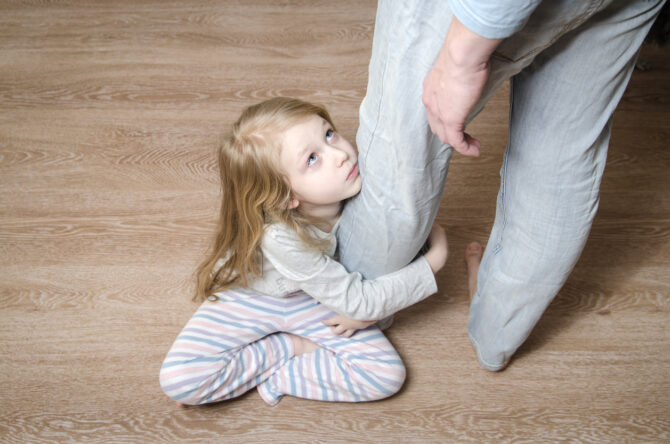When a parent walks away — whether physically, emotionally, or both — it leaves a mark that doesn’t just disappear with time.

Forgiveness doesn’t mean excusing what happened or pretending it didn’t hurt. It’s about finding a way to let go of the weight it has on you, so you’re not carrying it forever. If you’re trying to navigate the complicated emotions that come with a parent’s absence after they’ve decided to come back into your life, here are some things you can do to find peace, calm, and maybe even a new relationship with them.
1. Accept that your feelings are valid.

You don’t have to rush to forgiveness. If you feel angry, abandoned, hurt, or indifferent, that’s okay. A parent leaving isn’t a small thing, and whatever emotions come with it are completely natural. Trying to force yourself to move on before you’re ready only buries the hurt deeper. The first step is simply acknowledging how you feel without guilt or pressure to get over it too quickly.
2. Separate the past from your present.

What happened in your childhood will always be part of your story, but it doesn’t have to define how you see yourself now. If their absence made you feel unworthy, remind yourself that their choices were about them, not you. Forgiveness often starts by recognising that you don’t have to live in the shadow of their actions. You can be a full, whole person, even if they weren’t there for you the way they should have been.
3. Let yourself grieve what you didn’t have.

There’s no timeline for grieving a parent who left, even if it happened years ago. Sometimes, you have to process the loss of what could have been — a different childhood, a stronger relationship, a sense of security you never got. Letting yourself feel that loss without pushing it away can be a step toward healing. Grief isn’t just about losing a person; it’s about losing the version of life you thought you’d have.
4. Try to understand their reasons without excusing them.

Some parents leave because of addiction, mental health struggles, immaturity, or other personal battles. Understanding this doesn’t mean justifying what they did — it just means seeing them as a flawed human rather than an untouchable figure. People can have reasons for their actions without those reasons making it okay. If you can see their struggles without letting them define your worth, it might help loosen the grip of resentment.
5. Accept that they may never give you closure.

If you’re waiting for an apology, an explanation, or a moment where they finally make things right, you might be holding onto something that will never come. Some parents don’t acknowledge the damage they caused, and some aren’t even capable of it. Forgiveness doesn’t have to be dependent on their words or actions. It can be something you choose for yourself, whether or not they ever take responsibility.
6. Recognise how their absence shaped you, for better and worse.

Yes, it hurt. Yes, it left gaps. But it also made you who you are. Maybe it made you more independent, more empathetic, or more determined to show up differently in your own relationships. That doesn’t mean you have to be grateful for their absence. But acknowledging both the struggles and the strengths that came from it can help you move forward with a clearer perspective.
7. Set boundaries that feel right for you.

If they’re still in your life in some way, you get to decide what that relationship looks like. Forgiving doesn’t mean letting them walk back in and disrupt your peace if they haven’t changed. Some people find healing in reconnecting, while others need distance to fully move on. Either way, forgiveness and boundaries can exist together — you can let go of resentment while still protecting yourself.
8. Talk about it with someone who understands.
 Source: Unsplash
Source: Unsplash Keeping it all bottled up can make the hurt linger longer than it needs to. Whether it’s therapy, close friends, or someone who’s been through something similar, talking about it can help you process your emotions in a safe space. It doesn’t have to be a big dramatic conversation. Sometimes, just saying, “Yeah, this still affects me,” out loud is enough to take some of the weight off.
9. Release the idea that forgiving means reconnecting.
 Source: Unsplash
Source: Unsplash Forgiveness isn’t the same as reunion. You can forgive someone and still choose not to have them in your life. Letting go of anger doesn’t mean inviting them back in if that would only cause more harm. Sometimes, the healthiest thing you can do is wish them well from a distance and keep your focus on the relationships that truly bring you peace.
10. Avoid comparing your situation to anyone else’s.
 Source: Unsplash
Source: Unsplash Seeing people with loving, involved parents can bring up all kinds of complicated emotions — jealousy, grief, frustration. But comparing your journey to someone else’s won’t change what happened. Instead of focusing on what others have, try focusing on the relationships you do have—the people who have shown up for you, even if they weren’t the ones who ‘should’ have.
11. Focus on the kind of person you want to be.
 Source: Unsplash
Source: Unsplash When a parent leaves, it’s easy to let their actions define you. But forgiveness is about reclaiming that power. You get to decide who you are, how you show up in relationships, and what kind of future you build. Instead of dwelling on what they took from you, think about what you want to create for yourself, whether that’s healthier connections, emotional security, or just the freedom to move forward.
12. Let go of the need for them to “get it.”
 Source: Unsplash
Source: Unsplash Not all parents have the self-awareness to understand the pain they caused. Waiting for them to realise or change their ways can keep you emotionally stuck. Sometimes, the best thing you can do is accept that they may never fully grasp what they put you through. Forgiveness in this case means freeing yourself from the need for their validation.
13. Give yourself the love they didn’t.
 Source: Unsplash
Source: Unsplash If they weren’t there to provide the love, support, and encouragement you needed, it’s never too late to give those things to yourself. You don’t have to keep searching for external approval; you can be the person who shows up for you. Forgiveness doesn’t have to be about them. It can be about choosing to move forward with self-compassion, rather than carrying wounds that were never yours to hold.
14. Accept that forgiveness is a process, not a single moment.
 Source: Unsplash
Source: Unsplash Some days, you might feel at peace with everything. Other days, something will trigger old feelings, and it’ll hurt all over again. That doesn’t mean you’ve failed at forgiveness; it just means you’re human. Healing isn’t linear, and forgiveness isn’t about a single decision. It’s about choosing, again and again, not to let their absence control your happiness. And that’s something you can do at your own pace, in your own way.




